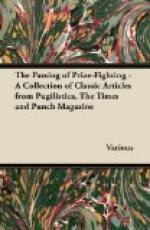Interval of Fifteen Minutes, spent by some of the lady spectators in speculation whether the dark and light patches on the blue curtains are due to design or the action of damp. After which the Fortress of Chioggia is disclosed, with a bivouac of the Genoese garrison. A bevy of well-meaning maidens enter with fruit and vegetables for the military, but, on the discovery that their wares are properties, and too firmly glued to the baskets to be detached, they retire in confusion. A small sail is seen behind the battlements; the soldiers poke at it with halberds until it retreats, whereupon, soldier-like, they dance. The sail returns with a still smaller one; red fire is burnt under the walls, which so demoralises the Genoese soldiery that they all tumble down with precaution, and the Venetians burst in and stand over them in attitudes as the scene changes to an Island near Venice and a Grand Aquatic Procession. (Here intelligent Spectators in the Stalls identify the first four pairs of gondolas,—which are draped respectively in icicles, pale green, rose-colour, and saffron,—as typifying the Seasons; another pair come in draped in violet, which they find some difficulty in satisfactorily accounting for. When two more appear hung with white and gold with a harp and palette at the prows, they grow doubtful, and the entrance of the two last couples, which carry shrines and images, reduces them to hopeless mystification. The Small Boy wishes to know whether anybody will be upset in the water, and being told that this is not a fixture in the entertainment, conceives a poor opinion of the capacity of Mediaeval Venice for lighthearted revelry.)




